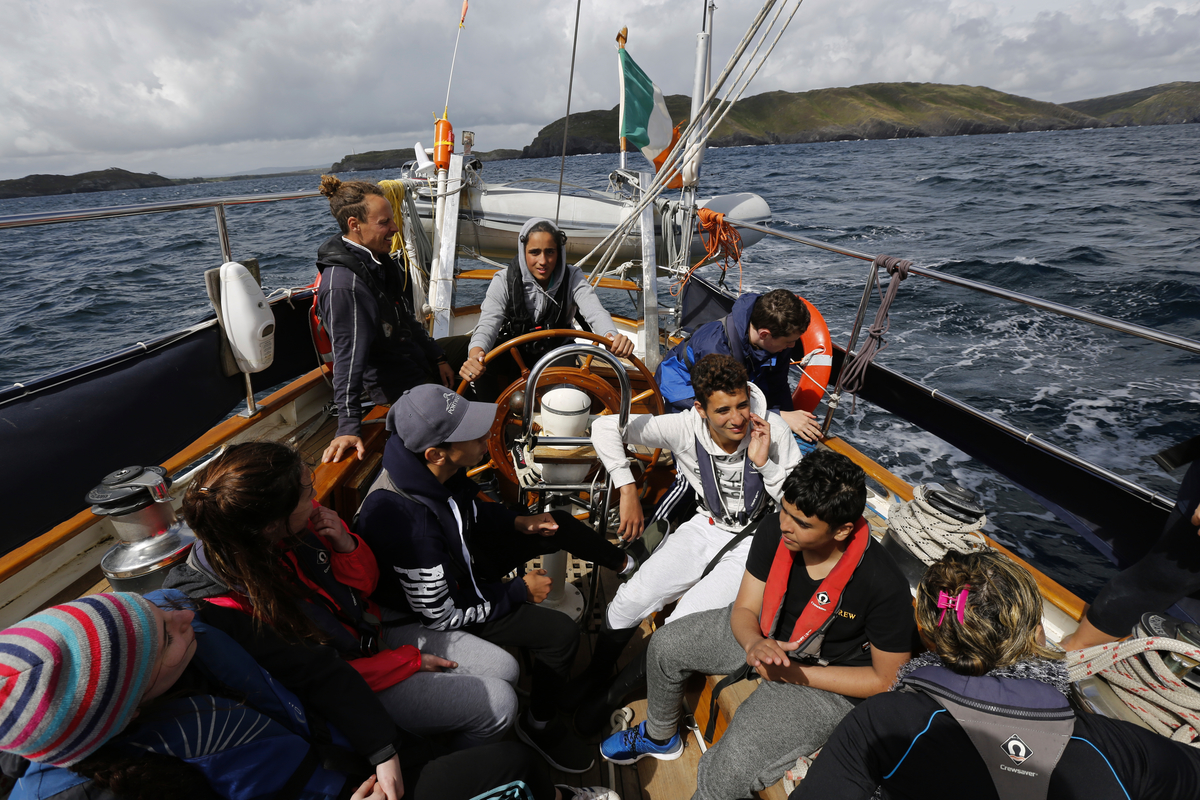Syrian and Irish teenagers pull together on sailing course

Syrian and Irish teenagers pull together on sailing course
On command, a group of teenagers strides forward and grasps the ropes of the main mast on the 70-foot schooner Spirit of Oysterhaven.
“Okay, let’s hustle,” shouts Shauna Gillan, first mate and second-in-command. “Omran, Hamza, you’re going to hoist the sail,” she orders, standing steady on the rocking deck.
“Sails up,” comes the response, as Hamza Alsayed Hassen, 17, and Oisín Ryan, 16, grimace with the effort of hoisting the sails aloft.
The two youngsters crank the winch and tie off the rope. With that, the boat turns on its axis, the sails fill, and it moves forward, leaving the safety of the harbour and sweeping into the Atlantic. “I like the responsibility,” says Hamza. “You have to work together, because otherwise you won’t get to where you want.”
“You can see a solid team mentality start to form from day one.”
He is one of 10 teenagers, five Syrian and five Irish, all between the ages of 15 and 17, who are learning to sail in the hazardous conditions around the Irish coast. In the space of a week, they will learn to steer, operate the winch, hoist sails and coil ropes neatly, all the time working together to keep afloat.
The course is part of a refugee integration project called Safe Haven Ireland, set up in 2015, which teaches young refugees and Irish teenagers how to sail on board the Spirit of Oysterhaven, Ireland’s largest sail training vessel.
It is a novel way to bring young people from different backgrounds together, and the brainchild of first mate Gillan, a human rights lawyer when she is not sailing.
“Sail training is an ideal way to foster bonds between different communities,” she says. “It’s the ultimate leveller. Everyone is thrown into an equally unfamiliar environment – their background before they’ve come on board becomes less important. You can see a solid team mentality start to form from day one.”
Omran Al Awihi, 15, came to Ireland in March. Like the other Syrians on board, he arrived via the European Union’s relocation scheme, which distributes asylum-seekers arriving in Greece and Italy to other countries in the EU. Ireland pledged to accept 1,152 people from Greece and Italy under the scheme by September 2017 and, so far, 524 have been transferred from Greece.
After a year and two months in Greece, Omran arrived in Ireland in March, moving with other Syrians to the town of in the west of Ireland.
“I knew Ireland was in the middle of the sea,” he says, although he never thought he would be sailing around it.
In the few days he has been on the boat, Omran has taken control of the wheel and learned to use the winch, hoist the sails and pull up the anchor, ensuring it does not get caught in the seaweed that is everywhere on the sea off County Cork in south-west Ireland. The only thing he does not enjoy is cleaning. “I’m the youngest in my family so am not used to washing the dishes,” he says.
However, the week’s sailing has left him in no doubt about his future career. “I want to be a sailor,” he says, smiling.
Above all, the goal is to have fun. “Sometimes we have too much,” says Kayli Smyth, 17, one of the Irish teenagers, also from Ballaghaderreen.
“We’re having craic most of the time” she says, using an Irish term that sums up fun, conversation and good times. “Sometimes too much craic!”
The Syrian boys left the hatch open the previous night, she says, which let in water from a night-time deluge and caused the girls on board to get wet through the next day. “We were soaked!”
They have remained friends and all look forward to meeting up at their local youth club the following week. That seems like a natural decision now, but just months ago “a lot of people were suspicious of the Syrians at first," says Diarmaid Geever, 16, one of the Irish teenagers from Ballaghaderreen.
“But now they have a better understanding. Generally speaking, people are very supportive and see that the Syrians are exactly the same as ourselves. If you put us all in a small confined space, with all our different personalities, you find that we all get on. They like music and games just like us. There are differences, but far fewer than some people think.”
















